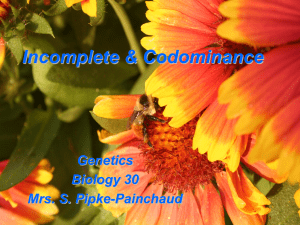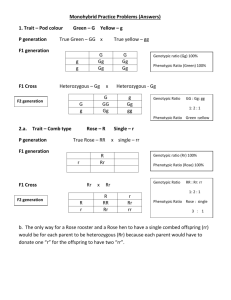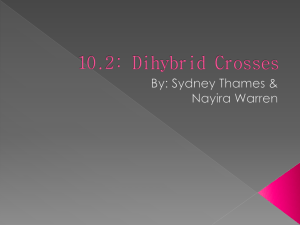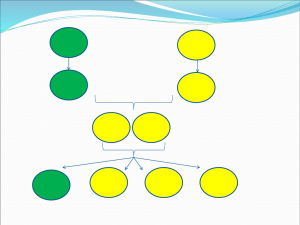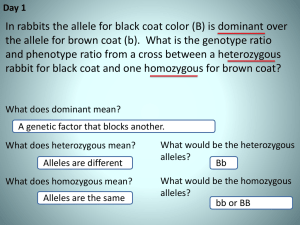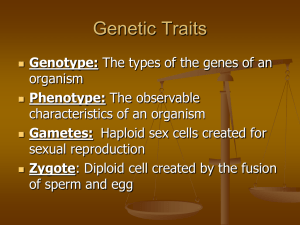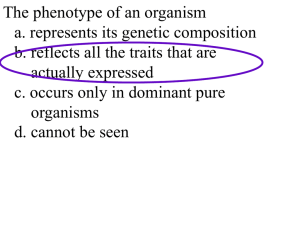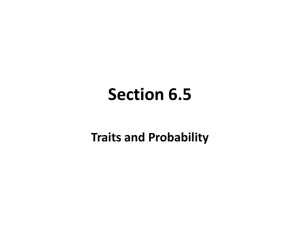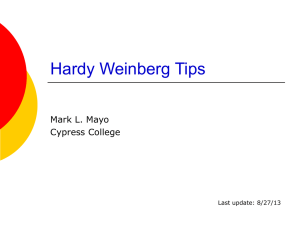Pure Dominant X Pure Dominant
advertisement
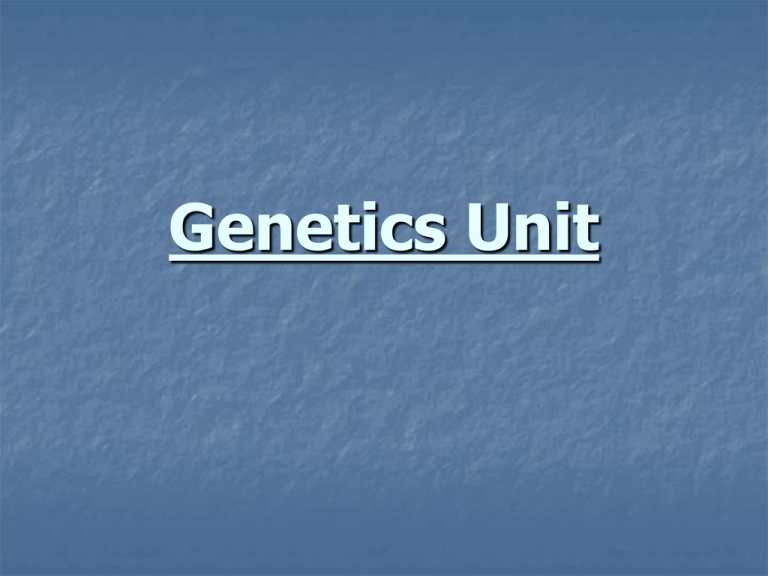
Genetics Unit Genetics = the field of biology devoted to understanding how characteristics are transmitted from parents to offspring Heredity = the transmission of characteristics from parents to offspring Mendel - “father” of modern genetics = laid the groundwork - experimented with garden peas - looked for traits = specific characteristics Mendel (cont) - P1 generation = parental generation - F1 generation = offspring of the parental generation - F2 generation = offspring of the F1 generation Mendel (cont) Mendel’s 1st Law = Law of Segregation 1) Organisms inherit two copies of each gene, one from each parent 2) Organisms donate one copy of each gene in their gametes. Mendel (cont) Mendel’s 2nd Law = Law of Independent Assortment 1) The presence of one trait does not affect the appearance of another trait Basics of Genetics - Gene = a segment of DNA on a chromosome that controls a specific trait - because chromosomes come in pairs, genes come in pairs Basics of Genetics (cont) - Allele = each of several forms of a gene - aka: letters - each allele has a specific location on a chromosome (= locus) - capital letters = dominant alleles - lowercase letters = recessive alleles Basics of Genetics (cont) - Homozygous = both alleles are alike - homozygous dominant = both capital letters = BB - homozygous recessive = both lowercase letters = bb - Heterozygous = alleles are different = Bb Polydactyly Polydactyly is the condition of having more than the typical number of fingers or toes. The allele for polydactyly is dominant. Basics of Genetics (cont) - Genotype = genetic makeup of an organism - consists of alleles (letters) - Phenotype = the appearance of an organism as a result of its genotype - aka: what does it look like - human phenotype can be altered by behavior Monohybrid Crosses = a cross between individuals that involves one pair of traits - Example: Black hair (B) in guinea pigs is dominant to brown hair (b) Example 1: Homozygous Dominant X Homozygous Dominant Genotypic Ratio Phenotypic Ratio Example 2: Homozygous Recessive X Homozygous Recessive Genotypic Ratio Phenotypic Ratio Example 3: Homozygous Dominant X Heterozygous Genotypic Ratio Phenotypic Ratio Example 4: Homozygous Recessive X Heterozygous Genotypic Ratio Phenotypic Ratio Example 5: Heterozygous X Heterozygous Genotypic Ratio Phenotypic Ratio Testcross = an individual of unknown genotype is crossed with a homozygous recessive individual - can be used to determine the genotype of any phenotype that is dominant Example 6: Testcross Genotypic Ratio Phenotypic Ratio Example 6: Testcross Genotypic Ratio Phenotypic Ratio Example 6: Testcross Genotypic Ratio Phenotypic Ratio Incomplete Dominance = the F1 Generation will have a phenotype in between that of the parents - Example: Red flowers (R) and White flowers (r) can make Pink flowers (Rr) Example 7: Incomplete Dominance Pink Flower X Pink Flower Genotypic Ratio Phenotypic Ratio Example 7: Incomplete Dominance Pink Flower X Red Flower Genotypic Ratio Phenotypic Ratio Example 7: Incomplete Dominance White Flower X Red Flower Genotypic Ratio Phenotypic Ratio Example 7: Incomplete Dominance Pink Flower X White Flower Genotypic Ratio Phenotypic Ratio Codominance = when both alleles for a gene are expressed in a heterozygous offspring - Example: Red coat color (R) in horses is codominant with ’ white coat color (R ) to make a horse with a mix of red and ’ white coat color (RR ) Example 8: Codominance Red Coat X White Coat Genotypic Ratio Phenotypic Ratio Example 8: Codominance Red/White Coat X White Coat Genotypic Ratio Phenotypic Ratio Example 8: Codominance Red/White Coat X Red Coat Genotypic Ratio Phenotypic Ratio Dihybrid Cross = a cross between individuals that involves two pairs of traits - Example: Black hair (B) in guinea pigs is dominant to brown hair (b) and rough coat (R) is dominant to smooth coat (r) Example 1: Homozygous Dominant X Homozygous Recessive Example 1: Homozygous Dominant X Homozygous Recessive Example 2: Heterozygous X Heterozygous Example 2: Heterozygous X Heterozygous
